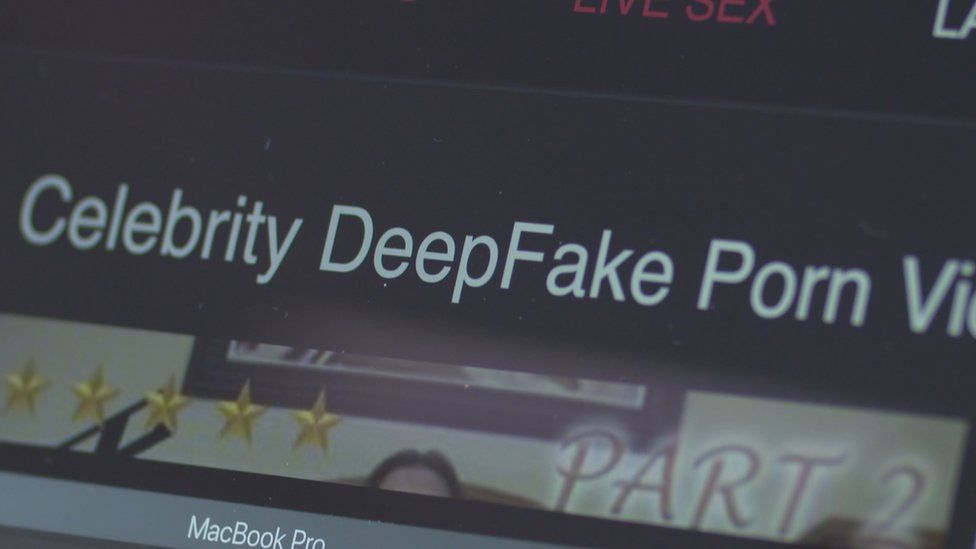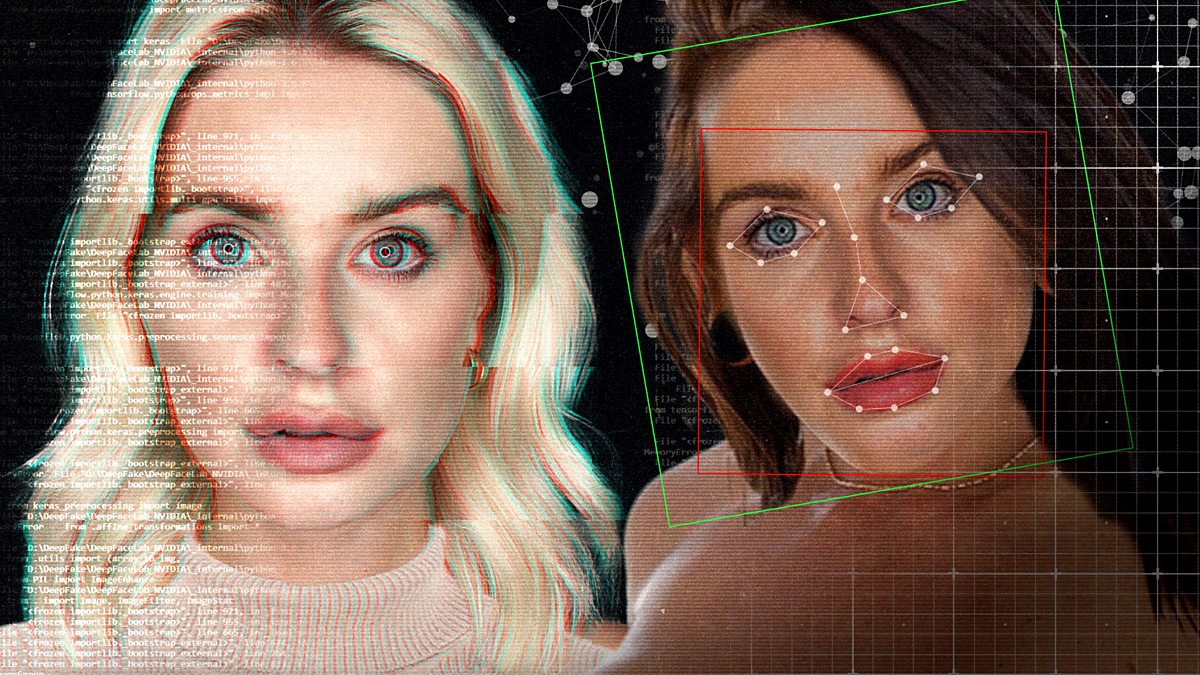Is the digital frontier blurring the lines between reality and fabrication, leaving us questioning what we can truly believe? Deepfake technology, with its capacity to convincingly mimic individuals, is rapidly reshaping our understanding of truth and consent, particularly in the realm of adult entertainment.
The evolution of artificial intelligence has brought with it a Pandora's Box of possibilities, and among the most unsettling of these is the rise of deepfakes. These synthetically created videos and images, capable of superimposing one person's likeness onto another, have found a particularly potent application in the production of pornographic content. Platforms like mrdeepfake.com have emerged as prominent purveyors of this technology, generating significant attention and, inevitably, considerable controversy.
The allure of deepfake porn is undeniable. It capitalizes on the public's fascination with celebrities and the often-unrealistic expectations surrounding their privacy. With a few clicks, anyone can be digitally inserted into a sexually explicit scenario, blurring the lines between fantasy and reality in a way that has never before been possible. This form of content distribution raises a plethora of ethical and legal questions, most notably in the realms of consent, exploitation, and potential for reputational damage.
The technical prowess behind deepfakes is remarkable. Sophisticated algorithms meticulously analyze facial features, voice patterns, and body language to create convincing simulations. The resulting videos can be disturbingly realistic, leaving even the most discerning viewer struggling to distinguish between genuine and manufactured content. This level of sophistication poses a genuine threat to personal privacy and the integrity of public figures.
The use of deepfakes in the adult entertainment industry has significant consequences. While proponents may argue that these videos are simply a form of digital art, or entertainment, the reality is far more complex. Without explicit consent, the creation and distribution of deepfake porn constitutes a form of non-consensual pornography, or "revenge porn", causing significant emotional distress and reputational harm to the individuals depicted. Moreover, the ease with which this technology can be accessed and utilized opens the door for malicious actors to target anyone, irrespective of their fame or influence.
Several platforms, including mrdeepfakes.com, have become synonymous with the creation and dissemination of celebrity deepfake porn. These websites boast vast libraries of videos featuring Hollywood actresses, K-pop idols, and online personalities. The content, often presented as entertainment, presents a clear ethical problem. Celebrities, who have no involvement in the creation of this content, are depicted in explicit scenarios, their likenesses used without their consent or knowledge. This is a blatant violation of privacy and constitutes a form of digital identity theft.
The legal and societal implications of deepfake porn are far-reaching. Existing laws regarding copyright, defamation, and revenge porn may struggle to keep pace with this rapidly evolving technology. It is vital that legislation be updated to address the specific harms caused by deepfakes, ensuring that victims have recourse and that perpetrators are held accountable. At the same time, it is the responsibility of internet users to be critical of the content they consume and to understand the ethical considerations at play.
The debate surrounding deepfake technology is complex. While some see it as a groundbreaking tool with potential applications in fields like filmmaking and education, the potential for misuse is undeniable. The capacity to manipulate images and videos at scale presents a serious threat to the media landscape and even democratic processes. It also introduces the real possibility of misinformation and the undermining of public trust.
The rise of deepfakes has forced us to confront uncomfortable truths about the digital age. We are now living in an era where anything can be faked, and this has a direct impact on our collective ability to distinguish between fact and fiction. It is crucial that we approach all online content with a healthy dose of skepticism, recognizing the potential for manipulation and being willing to question what we see.
One of the most concerning aspects of deepfake porn is the potential for the non-consensual creation and distribution of explicit content. Without clear ethical guidelines and legal frameworks in place, the possibility of exploitation and harm is vast. The legal implications are still evolving, with many jurisdictions struggling to define how deepfake content should be classified and regulated.
The platforms hosting deepfake porn often operate in a legal gray area. The content, while potentially illegal depending on the jurisdiction, is frequently difficult to police and remove. This allows the market for this kind of content to flourish, even though it is directly based on the violation of individual rights and dignity. This ongoing issue calls for international cooperation and the development of standard regulations.
The availability of deepfake technology is also tied to the issue of online safety, especially for young people. It's essential for parents and educators to discuss the risks of deepfake technology with children and to promote media literacy skills. Learning to recognize manipulated content and understanding the implications of online interactions are vital skills in the digital age.
The ethical discussions surrounding deepfakes encompass issues around consent, privacy, and the right to one's own likeness. The central issue of consent is often overlooked. When someone's face is used without their agreement, it's a significant ethical breach. Respecting personal boundaries is essential in any digital setting.
The proliferation of deepfake porn is a symptom of a broader issue: the lack of clear boundaries and accountability in the digital world. Many believe that platforms hosting such content should be held liable for the material that they allow on their sites, and it is a conversation that has yet to reach full resolution.
The conversation around deepfake content is just getting started. We are now at a point where deepfakes are not just a technical curiosity, but also a serious threat. There is an urgent need to create ethical principles, laws and regulations, and educational programs to safeguard individuals and society from the damage caused by this technology. The future of digital truth depends on it.
In this rapidly changing landscape, it is important to provide information in an informative way, but also in a way that can be used by users or the public to ensure they are informed and protected. In addition to providing an outline of the issue, it is important to consider the ethical questions that arise from the use of this technology.
The technology behind deepfakes has evolved at breakneck speed. Algorithms are becoming increasingly sophisticated, making the fakes more realistic and harder to identify. Deepfakes can now mimic facial features, voice patterns, and body language in a way that is almost indistinguishable from the real thing. This raises the risk of deception, exploitation, and abuse, as the line between real and fake becomes more blurred.
The digital landscape is awash with content that can be manipulated or fabricated. As such, it is vital to build media literacy and critical thinking skills. Users must learn how to assess the credibility of images and videos. They need to be aware of potential manipulation, and they should be prepared to question what they see. Education, awareness, and open discussion are vital tools in fighting the negative effects of deepfakes.
The ethical considerations associated with deepfake technology extend beyond the realm of adult entertainment. In politics and public life, deepfakes are increasingly used to spread misinformation, sow discord, and undermine trust. Manipulated videos can be used to misrepresent the statements of politicians, damage their reputations, or influence elections. It's essential that media literacy initiatives be expanded to protect against this form of manipulation.
The use of deepfakes in the adult entertainment industry carries serious legal and ethical implications. Deepfake porn is often created without the consent of the individuals depicted, constituting a form of non-consensual pornography. Victims of deepfake porn may experience significant emotional distress, reputational damage, and even legal complications. Laws concerning revenge porn, copyright infringement, and defamation may be applicable, but their application can be challenging.
There's a need for greater accountability by platforms and content creators. Platforms that host or distribute deepfake porn often operate in a legal gray area, making it difficult to remove offending content or hold those responsible accountable. Stronger regulations and enforcement mechanisms are required to prevent the spread of non-consensual material and to protect the rights of individuals. This could include requiring platforms to proactively monitor content, implement detection algorithms, and establish effective reporting and removal processes.
The impact of deepfakes on the entertainment industry extends to the creation of realistic, albeit fake, pornographic content featuring celebrities and public figures. Platforms that focus on deepfake content have become a popular, though controversial, source for those seeking adult entertainment. The ethical dilemmas surrounding the use of AI in these videos, and the legal ramifications for all involved are considerable. The creators of these videos must consider the impact of their work on the reputations, privacy, and well-being of the individuals whose images they use.
Deepfake technology's impact is not limited to the adult entertainment industry. It can be used to generate misinformation, spread propaganda, and engage in malicious acts. Deepfakes can be used to create false narratives, manipulate public opinion, and undermine trust in institutions. The proliferation of deepfakes poses a serious threat to democratic processes and societal stability, highlighting the need for greater media literacy and critical thinking skills among the public.
The legal landscape surrounding deepfakes is evolving rapidly. Existing laws, such as those concerning defamation, copyright infringement, and non-consensual pornography, may not adequately address the specific harms caused by deepfake content. There is a need for specific laws that explicitly address deepfake creation and distribution, defining consent, setting standards for content moderation, and establishing legal recourse for victims of deepfake attacks. International collaboration is also vital to address the transnational nature of this threat.
A key focus in countering deepfakes is media literacy education. Teaching people to distinguish between genuine and manipulated content, helping them understand the techniques used in deepfake creation, and promoting critical thinking skills are essential in mitigating the impact of this technology. Educational programs, public awareness campaigns, and collaborative efforts between schools, media organizations, and technology companies are needed to empower individuals to navigate the digital landscape with greater confidence and safety.
The potential consequences and implications of deepfake technology extend far beyond the entertainment world. As AI algorithms continue to evolve, the line between reality and fabrication blurs, creating new challenges for individuals and institutions alike. This technology can be used for both good and bad, emphasizing the need for responsible development and deployment.
Mrdeepfakes is a prominent platform that has drawn attention for offering tools that generate deepfake videos. This highlights the need for more awareness and regulation.
The rise of deepfake technology has created a moral and practical challenge for the internet and society. We need to build an environment where digital content can be viewed and consumed with trust. Protecting individuals from harm requires a multi-faceted approach, and includes a combination of technology, law, and education.
Platforms like Xvideos and Xnxx are among the world's largest pornographic websites. It is important to note their potential role in the dissemination of deepfake content and to analyze the implications of their dominance in the online adult entertainment industry.
The creation and distribution of deepfake porn pose significant ethical dilemmas and societal implications. One of the most controversial applications of this technology is the generation of deepfakes that replicate the appearances and voices of real people, which may include celebrities like Billie Eilish or Jenna Ortega. This content is created without the subjects knowledge or consent, raising questions about privacy, ownership of digital identities, and the potential for harm.
The use of deepfakes creates various ethical questions that highlight the conflict between free expression and individual rights, as well as between innovation and safeguarding individuals from harm. The potential for deception and manipulation underscores the need for open discourse and proactive measures to address the risks involved.
The creation and distribution of celebrity deepfake porn is not without controversy. The content is often made by users and the community for entertainment, and the purpose of the content is not to cause harm to the individuals depicted. Yet, the act of producing these videos without consent still raises concerns.
The emergence of deepfake content marks a pivotal moment in digital history. This is a call for more vigilance and calls for cooperation from all parties in the digital world, be it law enforcement, policy makers, or content creators. We need to confront the difficulties caused by this technology by fostering critical thinking, media literacy, and a shared dedication to protecting the integrity of the digital world.
It is essential to develop a thorough understanding of the technology and its application in different contexts. This includes an awareness of the technical aspects of deepfakes, as well as the ethical, legal, and social implications. A balanced and inclusive approach is necessary.
The impact of deepfakes is not limited to entertainment. Political campaigns, financial markets, and even the justice system may all face the risks of deepfakes. It is very important to have a holistic approach that includes technical, legal, and societal elements to address the damage created by deepfakes.
The creation of deepfake porn has raised concerns about consent and the use of personal images. The need for a clear and comprehensive legal framework is undeniable. This framework should address privacy, defamation, and unauthorized use of one's digital likeness. Only then can one defend against exploitation and abuse.
Deepfakes are challenging our view of reality. We need to promote a digital culture that emphasizes credibility, respect, and accountability. Deepfakes have a significant impact, so we need a culture that fosters critical thinking, ethical standards, and collaboration among technology developers, educators, and lawmakers.
The challenge of deepfakes is complex, but it also presents a chance to reevaluate and strengthen our methods of digital safety. The goal is to empower individuals with the knowledge and resources they need to safely and ethically interact with the digital world.
In conclusion, navigating the murky waters of deepfake technology requires a multi-pronged approach, encompassing technological advancements, legal frameworks, and educational initiatives. The digital world must collectively address the ethical dilemmas presented by this technology to protect individual rights and maintain the integrity of information in the digital age.



Detail Author:
- Name : Enid Waters
- Username : boyer.dasia
- Email : crist.tillman@hotmail.com
- Birthdate : 1997-01-26
- Address : 27917 Willms Estate Treutelfort, HI 36513
- Phone : +1.407.688.3840
- Company : Weissnat PLC
- Job : Court Reporter
- Bio : Dicta eum doloremque quam. Nesciunt porro debitis quis dolorum totam eaque. Ut harum sed officiis cum accusantium aut sit.
Socials
instagram:
- url : https://instagram.com/jovani_windler
- username : jovani_windler
- bio : Labore quos deserunt sed ut. Consequuntur nisi occaecati non laudantium nostrum.
- followers : 867
- following : 2253
linkedin:
- url : https://linkedin.com/in/jwindler
- username : jwindler
- bio : Similique rerum ea quo sed adipisci provident.
- followers : 1502
- following : 1354
facebook:
- url : https://facebook.com/windler1993
- username : windler1993
- bio : Beatae in quia sed animi quasi. Inventore illo nisi nobis officia vel.
- followers : 1435
- following : 1770
tiktok:
- url : https://tiktok.com/@windler2007
- username : windler2007
- bio : Magni laborum quis sed aliquam quas.
- followers : 5882
- following : 1716
twitter:
- url : https://twitter.com/jwindler
- username : jwindler
- bio : Possimus iure magni repudiandae fugiat expedita ut. Et iste maiores et et rem quia expedita. Qui quos impedit quasi ipsam. Quam et nemo nisi.
- followers : 2520
- following : 2108